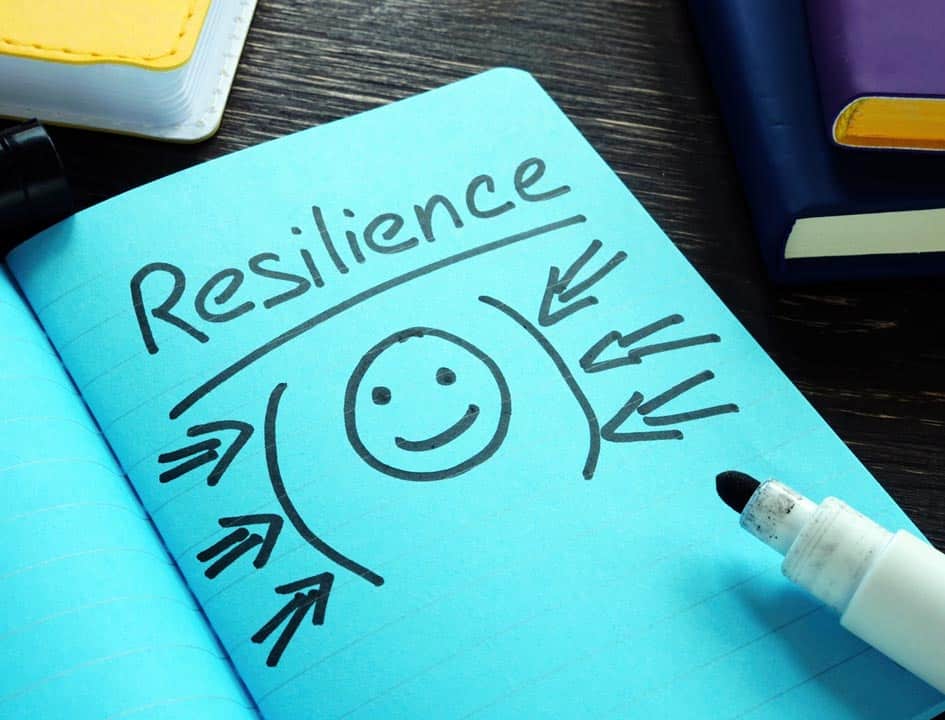written by:
reviewed by:

Resilience is not a condition you hope happens after a setback. Four mindsets — and a few supplements — for learning how to build resilience.
It’s been a rough couple of years. Everything everywhere is on fire. The way we work, shop, socialize, grieve, and learn has been turned upside down. All of your co-workers saw you in your underwear on Zoom. Your dog Walter pooped in your “office.” You miss people. And right now, you’re staring out the window at the snow piling up outside and you’re wondering if you can sink any lower into the couch cushions. But then that video of a teacher putting on a brave face plays 18,000 times on your timelines, and you think, you know what? I got this. Suddenly you feel energized. Filled with purpose. Ready for more. Bring it on.
This Is How You Build Resilience and You Need it Now More Than Ever
I’m writing this article at two o’clock on a cold January afternoon in Chicago. I spent the morning shoveling a metric ton of snow because the gas line on my snowblower fell out and I’m not good with tools. I sweat through my winter coat, through my heated gloves, and slipped on the ice three times. I can barely close my hands because they hurt so much. That I manage to type a single word is miraculous.
Except, OK. No, it’s not. Like a lot of you, I’m a master of self-deprecation. I just did it in that last paragraph because snapping back from a half-a-day of cardiac-inducing snow removal to write an article about resilience is not a miracle. It’s a skillset.
I Didn’t Bounce Back — I Dragged Myself Back
Resilience is not a condition you hope will happen after a setback. It’s not something that happens to you. It’s something you do. It might also be part of your personality. You know your friend Margaret who lives a life so Biblically wrought with disaster you’re afraid to sit next to her? Yet, she’s so positive. So upbeat, even after she crashed her car into a taco truck after getting fired on her birthday. How does she do it?
She Has a Resilience Mindset
Margaret cultivates a healthy attitude. She has developed soft skills that help her pass through major reversals and come out the other side with a smile on her face. She knows that language matters. She also knows these important truths:
Resilience Mindset One: Optimism
Margaret doesn’t see her difficulty as permanent. Let’s say she turns in code work on a project and it’s rejected. To her, it is a lesson to be learned; a problem to be solved. She doesn’t think, “My team leader thinks I’m an idiot”. Instead, she thinks, “My team leader didn’t like the work I did on this build.” She sees it as an opportunity for growth. That’s an optimistic, positive outlook that will sustain you.
Resilience Mindset Two: Commitment
Resilient people have goals. In their work, in their friendships and relationships, to their causes. They get up every day with these goals in mind so when there is a setback, they see it as an obstacle to avoid, not the end of their road. They’re looking past this problem to bigger goals. That kind of vision puts a mishap in perspective.
Resilience Mindset Three: Personal Control
Margaret’s superpower is recognizing there are events over which she has no control, and events over which she does. She puts her energy into the things she has influence over and doesn’t waste time fretting about troubles she has no part in.
Resilience Mindset Four: Personal Care
Perhaps this should be number one. You can’t fix a problem if you break down. Our mental faculties are only as capable as our physical capacity allows them to be. Even if you are in relatively good health, a major blow can knock you out of the game physically. And the last 10 years since 2020 have been quite the blow. There’s no shame in feeling a little bewildered, a little untethered in this turbulent recovery.
How to Build Resilience: Five Supplements You Can Use
Taking care of yourself sometimes means supplementing your mental resilience with a little boost to your physical resilience. The following supplements are shown to help in recovery.
1. B-Complex Vitamins
The B vitamins are thiamine, riboflavin, niacin, pantothenic acid, pyridoxine, biotin, cobalamin, and folic acid. They are the big shoulders of the body’s immune system, playing a leading role in cell health, muscle tone, red blood cell growth, cardiovascular health, energy levels, hormone production, cholesterol production, eyesight, nerve function, brain function, appetite, and healthy digestion. That covers pretty much everything going on in your body, so making sure you’ve got your B complex on track will definitely help you bounce back from anything. Even 2020.
2. Ashwagandha
Withania Somnifera is also known as Indian ginseng, poison gooseberry, and winter cherry. It is an herb used in the Indian Ayurvedic system of medicine and is quite good for you. According to an abstract available from the National Institute of Health, Ashwagandha has been shown to be measurably helpful in the following: reduction of cortisol production, anti-ulcerogenic, reduction of leucocytosis, helps with cognition, showed a reduction of ovarian tumors in mice, and has been shown to have a strong effect on neurodegenerative diseases such as Parkinson’s, Huntington’s, and Alzheimer’s.
3. L-Tyrosine
According to a government paper, L-Tyrosine alleviates or reduces cognitive decline due to physical stressors. It may help counter the effects of emotional stress as well.
4. Vitamin C
Vitamin C is well-known for fighting off the common cold. But it also helps reduce the production of cortisol, a stress hormone. Vitamin C is a high-powered antioxidant that fights oxidative stress and boosts immune function.
5. Multi-Vitamins
These are the kitchen-junk drawer of micronutrients — they have a little bit of everything you need to keep you going strong. A good multi-vitamin is comprised of thiamin, riboflavin, niacin, B6, B12, folate, calcium, magnesium, selenium, zinc, vitamins A (including beta carotene), E, and K, and Vitamin D2 or D3.
Getting Help Learning How to Build Resilience
Look, you might have mastered all the soft-skill superpowers in the universe, your attitude may be next-level healthy, but depression, anxiety, and burnout are real. Sometimes healthy, resilient people get that way because they know when and how to ask for professional help. And there is no shame in that. None. Ever.
© Photos / iStock
The information provided on Health Food Radar is intended for general informational purposes only. While we strive to offer accurate and up-to-date content, we do not provide medical advice, diagnosis, or treatment. Always consult with a qualified healthcare professional before making any dietary or lifestyle changes, especially if you have underlying health conditions or concerns.



